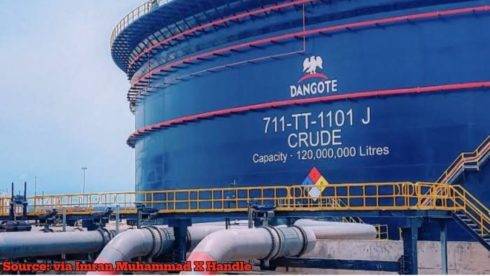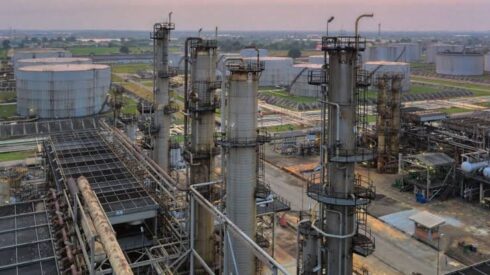In a bid to address the dynamics of petrol pricing, oil marketers have engaged in deliberations with Dangote Refinery, proposing a benchmark price of N550 per litre for petrol within the Lagos region. Alhaji Abubakar Migandi Garima, President of IPMAN, revealed that these discussions are centered around various factors including pricing mechanisms, profit margins, and logistical intricacies. The aim is to establish a pricing structure that accurately mirrors the local cost of production and distribution, thereby ensuring sustainability within the industry. It’s anticipated that price differentials may emerge across regions owing to variances in operational costs and distances traveled for distribution.
This collaborative effort underscores the industry’s commitment to achieving a fair and transparent pricing system reflective of the prevailing economic realities. By engaging in ongoing negotiations, stakeholders are striving to strike a balance between profitability for oil marketers and affordability for consumers. The proposed price of N550 per litre signifies a crucial step towards fostering stability within the petroleum sector, while also catering to the diverse needs and challenges faced by stakeholders across the supply chain. As discussions progress, it’s expected that a consensus will be reached, paving the way for a sustainable pricing framework that supports the growth and development of the industry.
Oil Marketers: Ongoing Negotiations and Considerations
In Nigeria’s intricate petroleum landscape, the ongoing deliberations between oil marketers and the Dangote Refinery shed light on the multifaceted considerations shaping pricing strategies. Delving into intricacies such as production costs, transportation expenditures, and nuanced regional demand dynamics, stakeholders meticulously scrutinize every facet to ascertain an equitable and competitive pricing structure for locally refined petrol. This concerted effort reflects a strategic move towards aligning market forces with the country’s economic imperatives, seeking to strike a delicate balance between affordability and profitability within the petroleum sector.
As anticipation mounts for the refinery’s verdict, stakeholders envisage a paradigm shift where domestically sourced petrol holds sway over its imported counterparts. Leveraging Nigeria’s bountiful crude oil reserves and mitigating logistical bottlenecks, domestically refined petrol is poised to offer discernible cost advantages. This impending transformation not only underscores the nation’s quest for energy independence but also signifies a pivotal moment in recalibrating the dynamics of Nigeria’s petroleum market, heralding a new era of economic resilience and competitive advantage on the global stage.
Oil Marketers Propose Regional Price Variations and Supply Chain Efficiency
Proposing a standard price of N550 per litre in Lagos underscores the necessity of adopting adaptable pricing strategies that can accommodate the regional variations in operational expenses. This move reflects a proactive approach to address the diverse economic landscapes within Nigeria. With the country’s extensive geographical diversity, oil marketers advocate for pricing adjustments that consider location-specific factors such as distribution logistics and infrastructure accessibility. By acknowledging these nuances, stakeholders can establish pricing structures that not only optimize supply chain efficiency but also promote fair and accessible distribution of petroleum products nationwide.
Implementing flexible pricing strategies tailored to regional realities is pivotal in fostering a sustainable and inclusive petroleum market. By aligning prices with the specific needs and challenges of each region, stakeholders can mitigate disparities in access and affordability. This approach not only ensures equitable distribution but also enhances overall market efficiency by responding to local demand dynamics. Through collaborative efforts between policymakers, oil marketers, and other stakeholders, Nigeria can establish a pricing framework that fosters resilience, innovation, and equitable access to petroleum products across its diverse landscape.
Oil Marketers Anticipated Benefits of Local Refining and Economic Impact
The forthcoming introduction of locally refined petrol heralds a significant turning point for Nigeria’s energy landscape, promising a multitude of advantages for the nation’s economy and energy security. With a strategic focus on tapping into domestic crude oil reserves and harnessing indigenous refining capabilities, Nigeria aims to mitigate its reliance on costly fuel imports while bolstering its energy resilience. This shift not only promises to reduce import dependency but also lays the foundation for a more robust and self-sustaining energy sector, thereby enhancing the country’s overall economic stability.
Furthermore, the move towards local refining is poised to catalyze a cascade of socio-economic benefits, ranging from job creation to technological advancement and sustainable development. As the nation invests in expanding its refining infrastructure and fostering a conducive environment for downstream value addition, it sets the stage for the emergence of new employment opportunities across the energy value chain. Additionally, by nurturing homegrown refining expertise and encouraging innovation in refining processes, Nigeria stands to position itself as a regional leader in energy production and pave the way for long-term prosperity and resilience.
Implications for Consumer Affordability and Market Competition
In anticipation of the negotiation results, stakeholders are closely monitoring the potential ramifications for both consumer affordability and market dynamics. The suggested price of N550 per litre signifies a delicate equilibrium between addressing production costs and ensuring commercial feasibility. However, lingering apprehensions persist regarding its potential strain on household budgets and its contribution to inflationary pressures. As discussions unfold, there’s a heightened focus on how this pricing decision will affect various sectors of the economy, with particular attention to its ripple effects on consumer spending patterns and overall market stability.
Additionally, the ascent of Dangote Refinery as a formidable contender in the petroleum landscape introduces a new dimension to the competitive arena. Its emergence promises to catalyze innovation and drive efficiency enhancements throughout the industry. The prospect of heightened competition spurred by the refinery’s operations brings anticipation of improved product quality, streamlined processes, and potentially more competitive pricing strategies, ultimately benefiting both consumers and industry players alike. As stakeholders navigate this shifting landscape, there’s an underlying optimism for a more robust and resilient petroleum sector characterized by increased dynamism and innovation.
Oil Marketers: Collaboration and Regulatory Oversight
To navigate the evolving landscape of pricing strategies and market regulations in the petroleum sector, robust collaboration between industry stakeholders and regulatory bodies is imperative. Transparency, accountability, and strict adherence to established standards will serve as the cornerstone for fostering fair competition and safeguarding consumer interests. By prioritizing these principles, regulatory authorities can ensure equitable market access for all players while maintaining a level playing field, thereby promoting sustainable growth and stability within the sector.
Nigeria’s vision for its petroleum industry hinges on creating an environment conducive to investment and innovation. By implementing effective regulatory frameworks and fostering partnerships with key industry players, the country aims to leverage its abundant energy resources to drive economic development and regional leadership. Through strategic initiatives aimed at enhancing refining capacity and expanding distribution networks, Nigeria seeks to capitalize on its position as a major player in the global energy market, thereby cementing its status as a formidable force in the realm of petroleum refining and distribution.
Table of Contents
Discover more from OGM News NG
Subscribe to get the latest posts sent to your email.













